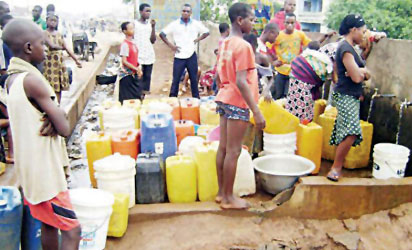Every year, the world marks Water Day on Mach 22. In this article, a founding member of WaterSan Perspective, Ama Kudom-Agyemang, who is based in Accra, Ghana, wonders if there is a reason to celebrate water in Ghana

To some Ghanaian media persons who hosted radio and television discussions in relation to celebration of World Water Day, there is absolutely no reason to do so. Their contention is that some Ghanaians still lack access to safe water.
One of the television discussions was done against the background of a news story from a community in the Volta region, where the people are just fetching water from a filthy stream, because there is no other source of water. In some instances, the water source is just a murky pond that community members share with cattle. Besides, the periodic outbreaks of cholera and other diarrhoea-related diseases, which are all water related are blemishes in the country’s water status.
To these media personalities, as long as a cross section of Ghanaians still lack access to safe water, there is no cause for celebration.
But upon sober reflection, these bothersome water related issues also provide the basis for Ghanaians and the world at large to celebrate water. In 1992, the United Nations instituted March 22nd as World Water Day, to draw global attention to the importance of water as a vital resource to life. The celebration is also used to remind people everywhere that scarcity and misuse of fresh water, pose a serious and growing threat to sustainable livelihoods and development. Furthermore, the celebration is an opportunity to learn more about water related challenges and be inspired to take action to make a difference.
Consequently, since 1993, World Water Day has been celebrated annually to highlight an aspect of water that requires urgent attention. Themes such as water for life, water for the future, coping with water scarcity, clean water for a healthy world, water and food security, the world’s water is there enough, and women and water, have been the focus for past celebrations.
The international celebration for this year’s World Water Day focused on “Water and Jobs,” while the Ghana national theme was, “Improved Safe Water Access for Sustainable Livelihoods.” Both themes highlighted the two-way relationship between water and the decent work agenda in the quest for sustainable development.
The celebration made water the subject of media reportage and debates throughout the country. The media engagement brought to the fore, the issue of how water scarcity and shortages in supply are undermining job sustainability, livelihood opportunities and socio-economic development in some parts of the country.
If you consider that Ghana is an agrarian nation with significant number of people engaged in agriculture, then, the issue of sustainable water availability becomes crucial. Water availability for agriculture becomes urgent especially in the face of dwindling farm lands, competing land uses, soil erosion and degradation, and climate change impacts. So, improved safe water access for sustainable livelihoods is not just about water for domestic use, but also water for agriculture, industry and the environment.
Therefore, we celebrate water because it is about the – 1.5 billion people – including farmers and all other workers whose jobs depend on the availability of freshwater.
In his statement to commemorate the Day, UN Secretary General Ban Ki Moon noted that “all workers can be harmed by poor water and sanitation.” The statement said “of two million work-related deaths every year, nearly one-in-five are caused by poor quality drinking water, inadequate sanitation and poor hygiene.”
According to the statement, the Secretary General was concerned about the fact that people with the least access to water and sanitation often also lack access to health care and stable jobs, thereby perpetuating the cycle of poverty. The statement said the Secretary General was convinced that “the basic provision of adequate water, sanitation and hygiene services at home, at school and in the workplace enables a robust economy by contributing to a healthy and productive population and workforce.”

